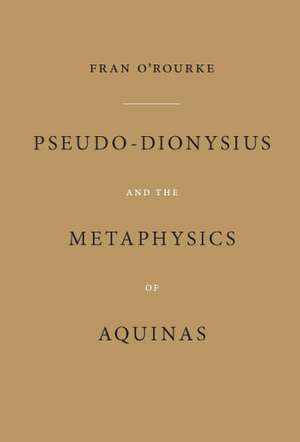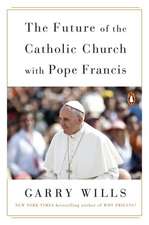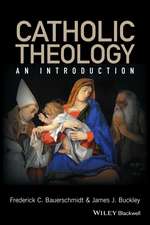Pseudo–Dionysius and the Metaphysics of Aquinas
Autor Fran O`rourkeen Limba Engleză Paperback – 2 noi 2005
"This is one of the two or three most important books on Aquinas published in the last fifty years." —Alasdair MacIntyre, University of Notre Dame
Although Pseudo-Dionysius was, after Aristotle, the author whom Thomas Aquinas quoted most frequently, surprisingly little attention has been paid to the role of this Neoplatonist thinker in the formation of Aquinas' philosophy. Fran O'Rourke's book is the only available work that investigates the pervasive influence of Pseudo-Dionysius on Aquinas, while at the same time examining the latter's profound originality. Central themes discussed by O'Rourke include knowledge of the absolute, existence as the first and most universal perfection, the diffusion of creation, the hierarchy of creatures, and their return to God as final end. O'Rourke devotes special attention to the Neoplatonist element in Aquinas' notion of "being" as intensity or degree of perfection. He also considers the relation of being and goodness in light of Aquinas' nuanced reversal of Dionysius' theory of the primacy of the good, and Aquinas' arguments for the transcendental nature of goodness.
Although Pseudo-Dionysius was, after Aristotle, the author whom Thomas Aquinas quoted most frequently, surprisingly little attention has been paid to the role of this Neoplatonist thinker in the formation of Aquinas' philosophy. Fran O'Rourke's book is the only available work that investigates the pervasive influence of Pseudo-Dionysius on Aquinas, while at the same time examining the latter's profound originality. Central themes discussed by O'Rourke include knowledge of the absolute, existence as the first and most universal perfection, the diffusion of creation, the hierarchy of creatures, and their return to God as final end. O'Rourke devotes special attention to the Neoplatonist element in Aquinas' notion of "being" as intensity or degree of perfection. He also considers the relation of being and goodness in light of Aquinas' nuanced reversal of Dionysius' theory of the primacy of the good, and Aquinas' arguments for the transcendental nature of goodness.
| Toate formatele și edițiile | Preț | Express |
|---|---|---|
| Paperback (1) | 355.76 lei 6-8 săpt. | |
| MR – University of Notre Dame Press – 2 noi 2005 | 355.76 lei 6-8 săpt. | |
| Hardback (1) | 696.97 lei 6-8 săpt. | |
| MR – University of Notre Dame Press – 29 sep 2022 | 696.97 lei 6-8 săpt. |
Preț: 355.76 lei
Nou
Puncte Express: 534
Preț estimativ în valută:
68.10€ • 73.99$ • 57.24£
68.10€ • 73.99$ • 57.24£
Carte tipărită la comandă
Livrare economică 21 aprilie-05 mai
Preluare comenzi: 021 569.72.76
Specificații
ISBN-13: 9780268037246
ISBN-10: 0268037248
Pagini: 318
Dimensiuni: 153 x 228 x 22 mm
Greutate: 0.44 kg
Ediția:1st Edition
Editura: MR – University of Notre Dame Press
ISBN-10: 0268037248
Pagini: 318
Dimensiuni: 153 x 228 x 22 mm
Greutate: 0.44 kg
Ediția:1st Edition
Editura: MR – University of Notre Dame Press
Recenzii
“The substantial and detailed analysis of the texts of both authors will prove an invaluable work of reference for students of Pseudo-Dionysius and Aquinas." —International Philosophical Quarterly
"A truly magnificent study." —Angelicum
"Although the argumentation of the book is subtle and profoundly conceived, it is stated with the most lucid and compelling clarity. The book was a labour of love and is certain to remain for many decades or more the standard work in an extraordinarily difficult area of the history of metaphysics." —International Journal of Philosophical Studies
"The book's footnotes constitute a terrific, topically arranged guide to the primary sources." —Speculum
“… The completeness of O’Rourke’s survey of the vast quantity of relevant (and often untranslated) text, as well as his extensive knowledge and prudent employment of the multilingual literature, make it a genuinely useful resource for scholars….” —Journal of Ecclesiastical History, 59, 1, January 2008
Notă biografică
Fran O’Rourke is senior lecturer in the School of Philosophy at University College Dublin, Ireland.








